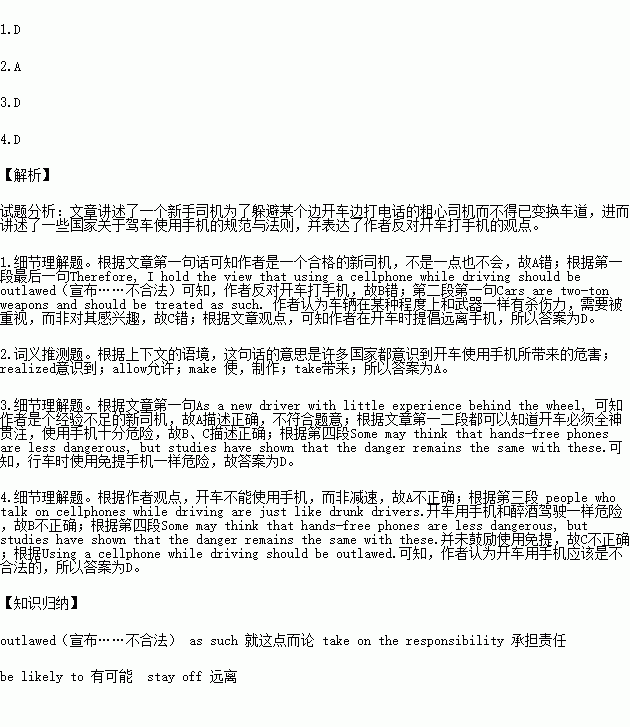题目内容
As a new driver with little experience behind the wheel, having to turn into another lane(车道)to avoid a careless driver talking on a cellphone is not something that I am prepared for. According to the New England Journal of Medicine, an accident is four times more likely to happen than normal while you are talking on the phone. Therefore, I hold the view that using a cellphone while driving should be outlawed(宣布……不合法).
Cars are two-ton weapons and should be treated as such. When drivers put a key in the engine, they are taking on the responsibility of being a driver. Answer the phone while driving is like taking the safety off a gun ― at any moment something could go wrong and change a life forever.
A few countries, including Australia, Great Britain, Spain and Israel, have recognized the damage that cellphone use can cause. According to Tom Alex of The Des Moines Register, people who talk on cellphones while driving are just like drunk drivers. They are likely to make a deadly mistake, causing them to hurt themselves or someone else.
Some may think that cellphone are helpful when you need directions or are in an emergency situation. Although I agree, I believe the safest way to use your phone is to pull over to the side of the road first. Some may think that hands-free phones are less dangerous, but studies have shown that the danger remains the same with these.
Using a cellphone while driving should be outlawed. One small mistake could change your whole life. Please don’t let that happen ― stay off your cellphone while driving.
1.It can be inferred that the writer ________.
A. doesn’t know how to drive at all
B. likes to use a cellphone while driving
C. take a great interest in using his car as a weapon
D. prefers to stay off his cellphone while driving
2.The underlined word “recognized” in the third paragraph can be best replaced by “________”.
A. realizedB. allowedC. madeD. taken
3.Which of the following statements is NOT true?
A. The author is not quite experienced in driving yet.
B. Using a cellphone while driving is quite dangerous.
C. Drivers behind the wheel should pay full attention.
D. Using hands-free phone is less likely to cause accidents.
4.According to the writer, ________.
A. drivers should slow down while talking on the phone
B. cellphone talking while people are driving is more dangerous than drunken driving
C. drivers should be encouraged to use hands-free phones while driving
D. using a cellphone while driving should be forbidden
 孟建平小学滚动测试系列答案
孟建平小学滚动测试系列答案
